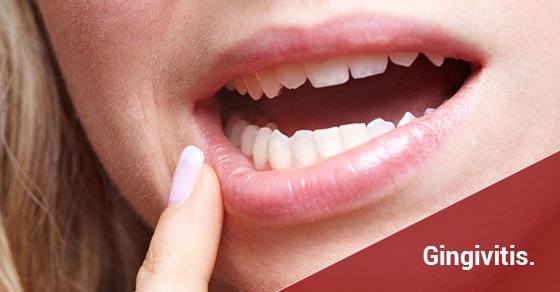Gingivitis is a very common oral disease that affects the gums. It can also be an early indicator of periodontal disease and causes inflammation and bleeding in the gums. Gingivitis is caused by bacteria from plaque buildup entering the gums, usually brought on by poor oral hygiene.
It’s important to catch gingivitis early on. It can be reversed by treatment and practising good oral hygiene. If left untreated, gingivitis can lead to gum disease, which can have severe consequences for your oral, and overall, health.

- Common symptoms of gingivitis include:
- Red or purple gums.
- Swollen gums.
- Bleeding gums.
- Pain and sensitivity.
- Bad breath.
If left untreated, gingivitis can have disastrous effects. Periodontal disease is always preceded by gingivitis. If gingivitis progresses into periodontal disease, it can lead to tooth loss or even bone loss.
Recent studies have also shown that gingivitis can have negative effects on overall health, specifically on the heart. While researchers are still unsure of the exact reason why, a link has been shown between gum and heart disease. Studies show that those with gum disease are twice as likely to also have heart disease.
This could be a coincidence, as in there are similar factors that can lead to gum disease, and heart disease, such as smoking, diabetes, or poor diet. Researchers have put forward a theory that bacteria from the mouth could enter the bloodstream and attach to fatty plaques in the blood vessels around the heart.
Oral health is an important part of overall health, and it’s very important to catch gingivitis early so that the effects can be reversed and to prevent it from developing into gum disease. If you suspect you have gingivitis, it is best to speak to your dentist about treatment. It is far easier to be proactive and treat gingivitis early on than to wait until it progresses.
If you have gingivitis as a result of plaque buildup, you should see your dentist for a thorough cleaning, during which the plaque will be removed. Following this professional cleaning, you can continue treatment at home by practising excellent oral hygiene and using anti-microbial mouthwash, tartar-control toothpaste, and a clean toothbrush that is replaced regularly.
As always, good oral hygiene is your best defence against gum disease. By brushing at least twice daily, flossing daily, and seeing the dentist for regular cleanings, you can prevent and reverse the signs of gingivitis.